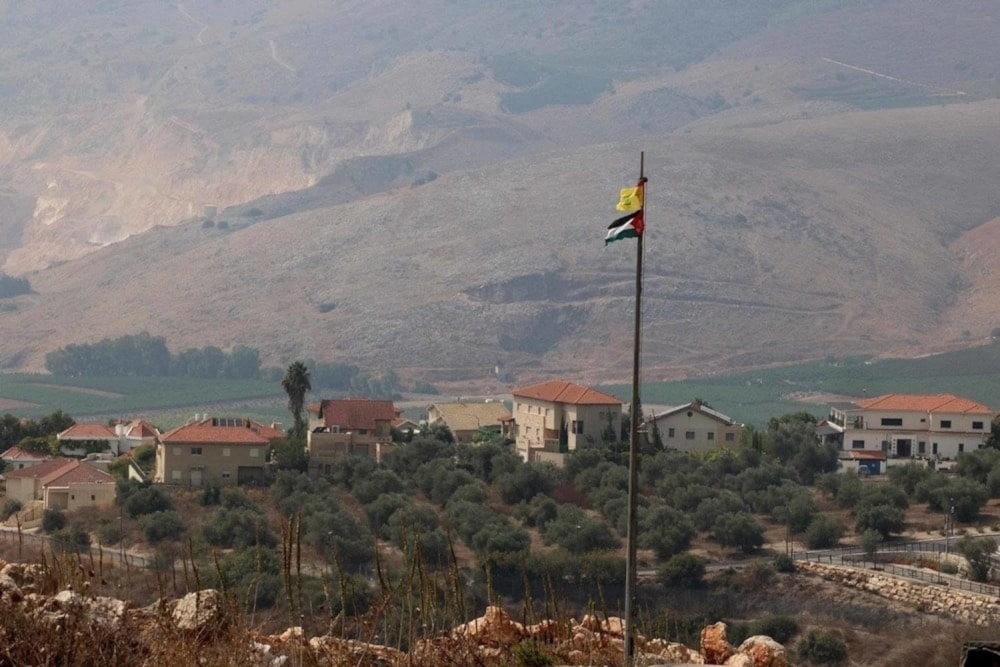Hezbollah missiles cause utter destruction: Israeli official in north
The heads of settlements in northern occupied Palestine affirm that the possibility of returning to their homes hinges on the "elimination of the threat posed by Hezbollah missiles."
-

The flags of Palestine (bottom) and Hezbollah (top) flutter in the foreground in the southern Lebanese plain of Khiam with the northern Israeli settlement of "Metula" in the background on October 10, 2023 (Photo by JOSEPH EID / AFP)
The heads of settlements in northern occupied Palestine spoke about the damage caused to the settlements by Hezbollah missiles. They emphasized that they would not be able to return to their homes unless the "threat of these missiles is removed".
David Azoulay, the head of the local authority in the 'Metula' settlement, conveyed to the Kan channel, "Unfortunately, we have experienced significant damage since the beginning of the war. Today marks four months with 80,000 people evacuated. I emphasize, that 80,000 people have been displaced from their homes; that's what needs to be acknowledged."
Concerning the homes damaged by Hezbollah missiles, he detailed, "Currently, we are conducting a survey using a drone. However, we estimate that approximately 130 homes out of a total of 500 along the border with Lebanon have been damaged."
Azoulay highlighted that "the majority of casualties in settlers' homes in Metula result from anti-tank missiles, particularly Kornet missiles." He further explained, "When the missile strikes the house, it not only destroys the structure but also causes extensive damage to the surrounding area. Many homes are affected by the blast wave."
Regarding Security Minister Yoav Galant's preference for a political solution with Lebanon rather than entering into a war now, Azoulay expressed skepticism, stating, "I do not believe in this solution. I am familiar with Hezbollah, having spent several years in Lebanon, and I can tell you that Hezbollah will not move north of the Litani River just because it was requested to do so. It is compelled to strike, and Israel, four months later, has not yet grasped that."
He added: "On Thursday, we conducted a meeting with the residents, and I conveyed to them that we will not consider returning unless we observe a state of calm, the absence of the threat of anti-tank missiles within a range of 8-10 kilometers, and the absence of al-Radwan forces along the fence. In Metula, we are well acquainted with the al-Radwan issue."
'Israel' may not undermine Hezbollah's capabilities: Zaltz
In a related context, the head of the Israeli occupation Regional Council in Upper al-Jalil, Giora Zaltz, expressed his belief that "more explicit objectives need to be established for verification." He added, "Given the current circumstances, it appears that Israel may not effectively undermine Hezbollah's significant capabilities."
In an interview with Channel 13, Zalts emphasized the need to define and actively pursue two military objectives. He stated, "The first goal is to eliminate the threat of launching anti-tank missiles directly towards Israel, and the second military objective is to eliminate the threat of fighters infiltrating Israel."
He contended, "Once the missile threat is eliminated and the danger of fighter infiltration is addressed, coupled with the implementation of an economic plan, I believe that residents of the north will begin returning to their homes within 3 to 6 months."
Anxiety grips northern settlers
Earlier this week, Israeli media outlets have confirmed that a state of uncertainty and tension prevails in the North. This has led to numerous speculations about the potential cost that the Israeli "home front" may bear in the event of a wider confrontation with Hezbollah.
It was reported that the mayors in the North have expressed their concern about the security situation, providing accelerated basic training for settlers to deal with intensive shelling.
Furthermore, the Israeli media pointed out that the prevailing mood among the settlers has shifted for the worse. Settlers of northern settlements are now aware of the consequences of fighting with Hezbollah, especially considering that thousands of settler housing units have become deserted.
This is happening as the Islamic Resistance in Lebanon - Hezbollah continues to conduct military operations against the Israeli occupation enemy in response to Israeli aggression on Gaza and the South of Lebanon, as the front along the Lebanese-occupied Palestinian border intensifies.

 4 Min Read
4 Min Read










